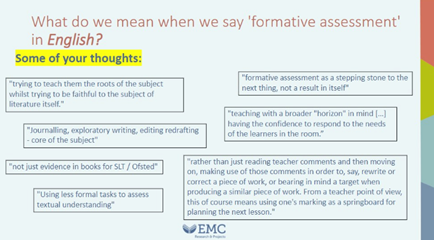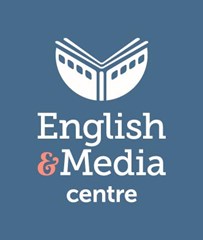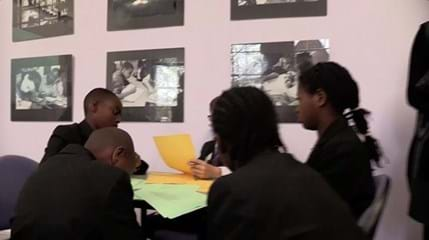Who are we?
The EMC Research & Projects team is led by Lucy Hinchliffe, full-time consultant at EMC, and Anmika Salter and Katie Kibbler, both teachers and Heads of English in North London, who are on secondment to the Research & Projects team two days a week. EMC set up the team in September 2022 to strengthen connections between the Centre and English classrooms, building on our previous classroom-based project work to explore aspects of teaching important to both the principles of the EMC and to teachers’ working lives. We’ve had such an interesting year, and we're excited to start sharing some of the work that’s emerged from our first project: exploring the thorny issue of KS3 assessment.
Why KS3 assessment – and why now?
At EMC, we’re often asked how best to assess KS3 English and, with the new team in place, we decided it was time to tackle this elephant in the [class]room. We had a good idea of current assessment practice at KS3, both from our own teaching experience and our work with English teachers across the country.Teachers attending our CPD often report a sense of dissatisfaction with the assessment systems that their schools and departments have adopted since 2014, in the pressurised years following the move to exam-only GCSEs and ‘life without levels’ at KS3. Most teachers and departments we speak to seem to feel confident that they are making positive changes with their curriculum design and content, but are frustrated by the troublesome tension between the richness of students’ classroom learning and the data and reporting required by their schools.
The three of us on the Research & projects team really recognise these issues and we’ve lived with their reality since qualifying. With each of us training between 2013 and 2015, we're part of the generation of English teachers educated in the coursework and Controlled Assessment GCSE era, but practising in the 100% exam era. We understand that the dissatisfaction arises from problems with the system, not the teachers, and that there is an appetite amongst teachers to reassert our professional autonomy when it comes to subject-specific learning and assessment. So, with this in mind, we set out last September to challenge the dominant model of English assessment at KS3 and explore a different way of doing things, that puts student learning, the formative nature of the subject and teacher expertise first.
The dominant English assessment system in schools
Over the past year, we have visited many English departments and discussed assessment systems with English teachers in a wide range of schools across the country. There are plenty of departments doing interesting and exciting things with assessment in English, and several working on in-house assessment projects of their own, encouraged in doing so by supportive senior leadership.
However, the dominant model of English assessment organised around a half termly or termly unit of work culminating in a final piece – which generally feeds into whole school data reporting – remains. A final piece showcasing all that students have learnt across a unit is often a logical and sensible end point to a unit, but because of accountability measures, the way it’s implemented in some settings is problematic. When the data, not the learning, becomes the most significant assessment focus, the final piece is over-emphasised and has a serious backwards impact on the learning of the unit. What students are doing, then, from lesson to lesson and unit to unit becomes a much-reduced version of what the curriculum might otherwise be, as it is tailored precisely to the assessment, rather than the assessment emerging from the more expansive work of the curriculum. This is the concern of many of the teachers we have worked with this year. Indeed, we saw several examples in which little meaningful writing other than the final, assessed piece was completed by students across the 6 to 8 weeks of a half term. Very often, all work completed across a unit was in service of the final, single assessed piece, or a mini version of it.
This is a problem because it is at odds with the creative nature of subject English and it shrinks the range, quantity and ambition of student work. The work produced by units assessed or reported on in this way can often be almost identical across a class of 30 students with a range of abilities and needs, because it has been structured and scaffolded so heavily to get to the ‘end point’. This is especially true when students are asked to respond to difficult texts in difficult forms too early in their school career – for example, year 7s writing essays about Victorian literature. Proponents might call this ‘mastery’, but we would argue the opposite – if English is a creative, arts subject, then mastering the subject means being able to respond with individual, creative, valid interpretations of one’s own. In the dominant assessment model, students are often coached so heavily towards their final piece from lesson to lesson that this is lost, and so the piece produced tells English teachers very little about what their students actually know or can do, or indeed could do in even only marginally different circumstances. This is problematic for student progress, for responsive, genuinely formative teaching and learning, and for the subject itself.
It means, in some settings, that students are generating only six complete pieces of writing per year – one per half-term – and each one of these is assessed, and often reported on. Given that writing in all its forms is integral to the subject, this isn’t enough. It doesn’t allow students to practise within the discipline, nor does it give them the space to try out all kinds of writing, including some that is messy, experimental and free from ‘assessment’. Those six assessed pieces often involve structured, analytical writing, presumably because students have to do so much of this at GCSE (which also, sadly, includes no assessed speaking aspect, another hugely important form of response in the subject as a result most often missing from KS3.) There has to be more to writing in English than this.
What did we do?
We wanted to shift the focus from the data collection back on to the subject, curriculum and student learning. This is not to say we wanted to take the focus off assessment – far from it; teachers are and should be engaged in ongoing, regular assessment of their students – but we certainly wanted to challenge ideas about the effectiveness of units in English organised around the assessment, that single piece of work at the end. After preliminary work in Katie and Anmika’s departments, we asked two English departments to work on a project with us, exploring the following research questions:
- How does formative assessment work best in English classrooms?
- What is the relationship between formative and summative assessment in English?
And sub-questions:
- What happens when students spend more time reading, writing and editing their work in English?
- What happens when English teachers have time to read and respond to student work?
- What happens when English teachers moderate and standardise KS3 work together regularly?
- Are there barriers to using formative assessment effectively in the English classroom?
- What happens when a single piece of assessment is removed from the end of a unit of work?
- What happens when a range of student work is used to summarise student attainment in English?
We’ve gathered a lot of really rich data to begin to formulate some answers to these: from student work, teacher interviews, written reflections, lesson observations, to conversations between colleagues in department moderation meetings.
As we began reviewing our collection towards the end of last year, we noticed some encouraging themes starting to emerge. Once teachers and students started to shift away from the idea that assessment is something that happens ‘at the end’, interesting things happened. For example, teachers involved in the project noted that students were often putting more effort into their class work, writing more, as well as more often, that there was more time for meaningful peer and self-assessment and that teachers felt they had a much more accurate and responsive sense of their students’ capabilities in the discipline.
At the same time, we’ve got a clear sense that changing perceptions about assessment, what it can or should look like in English, is complex and steeped in context. Through reporting on our work in the upcoming series of EMC blogs, we hope to offer an interesting contribution to this ongoing conversation, and perhaps encourage teachers to open up further discussions with their teams, too.




